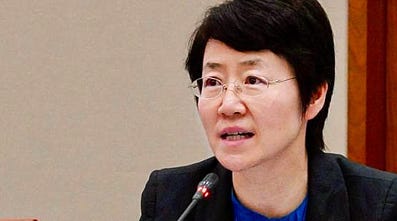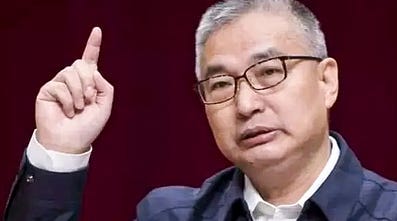determined to follow the path of Chinese-style modernisation
PREAMBLE
Where the supply side is to be smoothened, but the state’s role is still to ‘guide’ capital towards building common prosperity.
The Third Plenum Party policy shall be ‘Decision on Further Comprehensively Deepening Reform and Advancing Chinese Modernisation’ echoing the 2013 suite which launched Xi Jinping’s 习近平 vision of a market economy guided by the state.
That is, by 2035, the PRC will build a ‘high-level’ socialist market economy aligned with the Party's centennial goal of becoming a mid-level developed nation (per capita income of about US$25,000, doubling the current levels). Meanwhile, recalibrating the ‘socialist market economy’ under which the state leads, strengthening China's commitment to a strategic course on rapid industrialisation, burnishing the 'China Miracle' while guiding private enterprise.
A 4 June CPPCC (Chinese People's Political Consultative Conference) Standing Committee meeting added the qualifier ‘high-level’ to the socialist market economy. Proposals submitted by Yi Gang 易纲 former PBoC governor and current CPPCC Standing Committee member, reprised unfinished market reforms foreshadowed in 2013
deepening market reform
free circulation of production factors
fair competition
removal of measures adverse to consumption
building rules-based governance
framework for enterprises and consumers
state acting within the confines of PRC rules-based governance
high-level opening
Governance must be modernised, declared the Politburo at its recent June meeting. Development assumes confidence and sound expectations, explains Jia Kang 贾康 formerly at MoF (Ministry of Finance) Institute of Financial Sciences.
Here are other comments from reform-era PRC scholars:
Macroeconomic governance must move with the times, Zhang Bin 张斌, a CASS (Chinese Academy of Social Sciences) Institute of World Economics and Politics researcher, and a delegate to the Jinan symposium, wrote in Study Times. Increasing the impetus for growth, stabilising the macro environment and social fairness should anchor policy. Hastening economic transition by supporting private firms, macro policy should structurally promote consumption, suggests Xie Dong 解冬 a China National Democratic Construction vice chair and CPPCC Standing Committee member.
The misfit between Beijing’s desire to open more and mounting trade friction with ‘certain regions’, flags the need for a breakthrough at the Plenum, argues Lu Feng 卢锋 Peking University National Development Institute. As the post-WWII global monetary system fractures, the PRC, the largest emerging economy, is uniquely obliged to balance its macroeconomy, building a new order, he adds.
Now is the time to harmonise with those themes of high-quality development and deepening reform, advises Zhang Laiming 张来明 Development Research Centre. To Zhao Zhimin 赵志敏 Chinese Academy of Social Sciences secretary-general, this would mean rejecting the supremacy of capitalism, materialism and money. Given the need to shore up confidence in private business, the centre has a difficult balancing act at hand.
‘High-quality development’, shall require curbing linked risks in real estate, finance and local government debt, explains Han Wenxiu 韩文秀 Central Financial and Economic Affairs Commission Office.
The PRC is looking to become a major financial power in the long term, echoing language first introduced at the CFWC (Central Financial Work Conference). However, it must curb financial risk in the short term, insists Vice Premier and economic czar He Lifeng 何立峰. State coordination and strengthened regulation from local financial organisations are needed.
Other economic discourses include:
Lu Feng 卢锋 | Peking University National Development Institute deputy director
'Contradictions’ in the Bretton Woods framework mount with the rise of new major powers, largest of which is the PRC. Its internal state impacts the world at large, not least its polarised economy.
Displayed in successful industry upgrading and capacity expansion, supply-side factors are dominant, yet weak demand, flat prices, and resulting employment and profitability pressures are troubling.
Given this strong supply-side, coupled with the PRC scale, RMB internationalisatio seems a stronger candidate for global monetary makeover than other options. However, the continued structural imbalance makes this process seems less feasible. The Plenum, Lu hopes, will have some answers about the PRC role in an evolving world system.
Xie Dong 解冬 | China National Democratic Construction vice chair and CPPCC Standing Committee member
Fiscal and financial institutions should encourage transition in consumption and investment, explains Xie. Macro policy currently fails to coordinate: stimulus fails to move consumption while investment in one direction crowds it out in another.
Division of labour is needed between fiscal spending and finance: state action to remould income structure, and finance, more attuned to the consumption needs of lower income groups, offering them new products.
Investment too, needs more savvy: government bonds need managed differentiation, ensuring they are used on well-matched projects.
Zhang Laiming 张来明 | Development Research Centre deputy director
PRC material development has reached a point where common prosperity needs promotion, explains Zhang. Novel ‘contradictions’ (conflicts) in the New Era create problems demanding common prosperity be integrated into deepening reform.
The equity/efficiency equation (set by Deng Xiaoping as ‘efficiency comes first, with due attention to equity; reset in the Hu-Wen era as ‘equalising efficiency and equity‘) again needs resetting. This entails better remunerating according to work done, while better-distributing income, especially through redistribution. New ways are needed to raise middle and lower-income groups earnings from productive factors (land, capital, technology and data). This entails going beyond wages and boosting asset dividends to increase the middle class.
extracted excerpts from China Policy which is a Beijing-based research and advisory company





